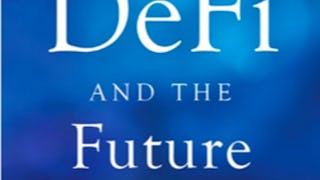Decentralized Finance: The Future of Finance is a set of four courses taught by Campbell R. Harvey (Professor of Finance at the Fuqua School of Business, Duke University, and a Research Associate of the National Bureau of Economic Research) that focus on decentralized finance (DeFi). In this first course, we begin by exploring the origins of DeFi and take a broad historical view from the earliest barter economies, such as the first peer-to-peer exchanges of bartering, to present day. The course also looks at historical examples of money having value even though it is not officially backed.

Enjoy unlimited growth with a year of Coursera Plus for $199 (regularly $399). Save now.

Decentralized Finance (DeFi) Infrastructure
This course is part of Decentralized Finance (DeFi): The Future of Finance Specialization

Instructor: Campbell R. Harvey
56,988 already enrolled
Included with
(1,537 reviews)
Recommended experience
What you'll learn
Articulate the history and origins of decentralized finance
Define the key components of decentralized finance's infrastructure
Explain which problems decentralized finance is designed to solve and how
Identify myths or common misconceptions about decentralized finance
Skills you'll gain
Details to know

Add to your LinkedIn profile
4 assignments
See how employees at top companies are mastering in-demand skills

Build your subject-matter expertise
- Learn new concepts from industry experts
- Gain a foundational understanding of a subject or tool
- Develop job-relevant skills with hands-on projects
- Earn a shareable career certificate

There are 4 modules in this course
This module provides a historical perspective of exchange beginning with early barter, specie currency (backed by, e.g., gold), fiat currency and electronic transfers. The module introduces some of the key problems that have arisen with the current system. It closes with the introduction to Satoshi Nakamoto’s famous 2008 paper which introduced cryptocurrency.
What's included
6 videos3 readings1 assignment
This module introduces the key foundations for DeFi, starting with the mechanics of blockchain including cryptographic hashing. The module then explores the innovation of smart contracting - a key ingredient for DeFi. There is also a discussion of the differences between the first cryptos and stablecoins.
What's included
6 videos1 assignment
This module explores the key problems with today’s legacy financial system which include: inefficiency (costly, slow, and insecure transactions); limited access (many cannot access banks and many that have bank accounts find it difficult to get loans); opacity (it is unclear how healthy our commercial financial institutions are); centralized control (current system is dominated by oligopolies that push prices higher than competitive prices) and interoperability (difficulty in moving funds across different legacy financial institutions).
What's included
5 videos1 assignment
The final module explores various different myths including: all cryptocurrencies are anonymous; blockchains are routinely hacked; quantum computing will destroy all blockchain based currencies; and the crypto ecosystem is so small that it is unlikely to compete with legacy financial institutions.
What's included
2 videos1 reading1 assignment
Earn a career certificate
Add this credential to your LinkedIn profile, resume, or CV. Share it on social media and in your performance review.
Instructor

Offered by
Explore more from Finance
 Status: Free Trial
Status: Free TrialDuke University
 Status: Free Trial
Status: Free TrialDuke University
 Status: Free Trial
Status: Free TrialDuke University
 Status: Free Trial
Status: Free TrialDuke University
Why people choose Coursera for their career




Learner reviews
1,537 reviews
- 5 stars
83.15%
- 4 stars
13.71%
- 3 stars
2.01%
- 2 stars
0.45%
- 1 star
0.65%
Showing 3 of 1537
Reviewed on Jul 29, 2022
Great introduction for a novice or someone that already has crypto knowlegable.
Reviewed on Mar 14, 2022
very high level, very short course maybe could have more support material to go deeper into some topics but i guess we will do that on part 2 , 3 and 4
Reviewed on Dec 13, 2021
The course largely follows the instructor's book albeit with an easier to follow introduction. As such, this first course is an overview and it gets us ready for the information to follow.

Open new doors with Coursera Plus
Unlimited access to 10,000+ world-class courses, hands-on projects, and job-ready certificate programs - all included in your subscription
Advance your career with an online degree
Earn a degree from world-class universities - 100% online
Join over 3,400 global companies that choose Coursera for Business
Upskill your employees to excel in the digital economy
Frequently asked questions
No. Completion of a Coursera course does not earn you academic credit from Duke; therefore, Duke is not able to provide you with a university transcript. However, your electronic Certificate will be added to your Accomplishments page - from there, you can print your Certificate or add it to your LinkedIn profile.
To access the course materials, assignments and to earn a Certificate, you will need to purchase the Certificate experience when you enroll in a course. You can try a Free Trial instead, or apply for Financial Aid. The course may offer 'Full Course, No Certificate' instead. This option lets you see all course materials, submit required assessments, and get a final grade. This also means that you will not be able to purchase a Certificate experience.
When you enroll in the course, you get access to all of the courses in the Specialization, and you earn a certificate when you complete the work. Your electronic Certificate will be added to your Accomplishments page - from there, you can print your Certificate or add it to your LinkedIn profile.
More questions
Financial aid available,

